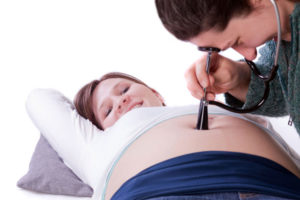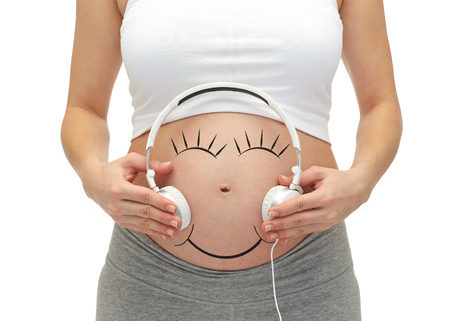How to Hear the Fetal Heartbeat at Home
How to Hear the Fetal Heartbeat at Home
Hearing your baby’s heartbeat for the first time is a miraculous and exciting moment. Listening to the heartbeat can give doctors important information about your baby’s health and hearing the heartbeat can provide assurance that the baby is growing as she should.
here are several ways to listen to the fetal heartbeat that can be done at home:
Use a Stethoscope
The stethoscope is a common medical tool used to amplify internal noises, especially for your heart and lungs. This trusty device is also good for listening to babies in utero. You can hear the baby’s heartbeat at about 18 to 20 weeks, depending on maternal and fetal factors like the weight of mom, the position of your baby, and the location of the placenta.
The Pinard Horn
 The Pinard horn is an older fetal listening device. The flat end is placed in the ear of the practitioner while the horn part is used to move around the pregnant mother’s abdomen. This is used to listen directly to the baby through the mother’s body with no use of electricity or power. The Pinard horn can be used from about 18 to 20 weeks of pregnancy. It is not as common at prenatal care appointments.
The Pinard horn is an older fetal listening device. The flat end is placed in the ear of the practitioner while the horn part is used to move around the pregnant mother’s abdomen. This is used to listen directly to the baby through the mother’s body with no use of electricity or power. The Pinard horn can be used from about 18 to 20 weeks of pregnancy. It is not as common at prenatal care appointments.
The Fetoscope
The fetoscope is the modern combination of both the stethoscope and the Pinard horn. It uses the practitioner’s forehead to conduct sound and has a more modern look, is made of metal and plastic compared to the wooden Pinard horn. It does not use ultrasound.he fetoscope is designed to be used on a pregnant mom. The lower end fetoscopes tend to work just as well as the more expensive brands. The main difference between the fetoscope and stethoscope is that most fetoscopes use the forehead to conduct sound to help you hear the baby, often giving better results to the user.
The Fetal Doppler (Fetal monitor)
Talk to your doctor about what type of exam he will use to hear the heartbeat. Typically, you will first hear the sound when your doctor or technician uses a fetal doppler, which uses sound waves to amplify the heartbeat. You will lie down on an exam table and the doctor will move a small probe on the surface of your stomach. This is a painless procedure and can usually detect the baby’s heartbeat at nine to 10 weeks, sometimes it takes 12 weeks to easily detect it.
Learn the factors that affect the sound
Even when you are using the proper tools, there are many reasons that you may not be able to detect the fetal heartbeat yourself. It’s important to know that things such as the baby’s position and your weight can impact whether or not you will clearly hear a heartbeat. If you feel there is a reason to be concerned, make sure to contact your healthcare provider right away
What is Fetal Doppler?
All YOU NEED TO KNOW ABOUT A HOME FETAL DOPPLER
Imagine you could listen to baby’s heartbeat anytime you’d like during pregnancy without making a trip to your OB’s office.An exciting proposition, isn’t it? Every expecting couple is bound to feel nervous when they are expecting their little one. It does not matter whether it is their first child or whether they have been through this phase before. What matters the most to every couple is that whether their loved and unborn child is growing safely in the mother’s womb or not.Many expectant mothers worry about the outcome of their pregnancy and the health of their babies on a daily basis.
What is a Doppler device?
A Doppler fetal monitor is a hand-held ultrasound transducer used to detect the fetal heartbeat for prenatal care. sometimes referred to as a pocket fetal Doppler. It uses the Doppler effect to provide an audible simulation of the heartbeat. The device sends sound waves through your skin and tissue in search of any movement. When movement is detected, the waves bounce back, creating a pattern, which the fetal Doppler records and plays back for you.
How early can I hear the baby’s heartbeat with a Doppler?
You may be able to hear – and see – your baby’s heartbeat for the first time when you’re about 8 weeks pregnant if you have an early ultrasound exam. Otherwise, you’ll probably first hear baby’s heartbeat with a fetal doppler until 10 to 12 weeks.However, baby’s heart starts to beat at around 6 weeks.
When can you start using a fetal Doppler?
In some woman, the fetal heartbeat can be detected as early as 8-12 weeks. The fetal heartbeat should be audible 95% of the time in 12-week pregnancies, and nearly 100% of the time after 14 weeks. Earlier in pregnancy, between 8-12 weeks, your success in finding the heart rate can have to do with the quality of your device.
Are fetal dopplers safe for the baby?
When used by a trained health professional, fetal heart Dopplers are entirely safe. But extra attention is needed when used at home.The technology that hand-held Dopplers uses is safe, but it’s how the results are interpreted by some moms that’s the problem. Some mom tends to overstress when they can not spot the heartbeat. As a matter of fact, the fetus on Week 10th-11th is quite tiny. They can easily hide behind mom’s placenta and other organs which in this case spotting the heartbeat is a bit difficult. The moderate use of Dopplers is recommended like twice a week and not using excessively during a session. Expecting moms are recommended to limit the duration to maximum 10 minutes including the time taking to spot the baby.
How does a home fetal doppler work?
Fetal doppler or fetal heart rate monitor is a handheld device which is used to listen to the baby’s heartbeat inside the womb of the mother. Each fetal doppler contains a transducer or a probe which sends out short pulses of ultrasound sound waves into the directed area of the body. Starting in the third trimester (at 28 weeks), you can track fetal movement using kick counts, which time how long it takes a baby to get to 10 movements. Doing kick counts help you to get to know your baby’s unique pattern if you know the baby is moving properly and normally, that’s a sign the baby as well. When a baby is stressed or is being starved of oxygen, he will slow down movement to conserve energy. If you report it to your doctor, professionals can determine what’s wrong, which can have a positive impact on health outcomes.
What is the difference between a doppler and an ultrasound?
Is it easy to confuse a home fetal Doppler monitor with a Doppler ultrasound machine buy the main difference between the two? The Doppler ultrasound used in the doctor’s office tends to use higher-frequency sound waves, making it more accurate and reliable. The version used by doctors also provides imaging, whereas the handheld devices offer only sound.
Can I skip my doctor and Ultrasound appointment and use my home doppler instead?
Absolutely NOT. The use of fetal doppler is not a replacement for the visit to a specialist. There are many other elements that will be examined while visiting the doctor’s office. Also, the Ultrasound appointments are essential as the baby development size is measured and also the visual images on a screen are observed for details.
Pregnant with Twins
Things You Need to Know If you’re Pregnant with Twins
A twin pregnancy is a double blessing, but it can also carry greater risks than singleton pregnancies.
Twins account for over 90 per cent of multiple births. There are two types of twins– identical (monozygotic) and fraternal (dizygotic). To form identical twins, one fertilised egg (ovum) splits and develops two babies with exactly the same genetic information.
1. You are technically a high-risk patient
The risk of many potential pregnancy complications – including preterm delivery, cesarean birth, pre-eclampsia (a blood pressure disorder) and gestational diabetes – is elevated among women carrying multiples, according to the American College of Obstetricians and Gynecologists. That’s why you need to be especially careful about following your OB-GYN’s recommendations for visits, screenings and other care. “With that extra diligence, we can hopefully keep risks of adverse outcomes at a minimum,”
2. You should ask if you have multiple placentas
While all identical twins share a placenta, fraternal twins or other multiples may not – and sharing has implications for their health, since one developing baby may get the shorter end of the nutrient-and-blood stick, says Dr. Mary Norton, president of the Society for Maternal-Fetal Medicine and a perinatologist and medical geneticist at the UCSF Medical Center. “Like any siblings,” she says, “if they’re sharing, they don’t always share well.” In that case, moms-to-be need closer and more frequent monitoring.
3. There’s a good chance you’ll deliver early
The most common risk of carrying multiples is preterm delivery. “For each additional fetus that’s in there, you deliver about a month earlier. Average twins deliver around 36 weeks instead of the 39 to 40 weeks that’s considered full-term for singletons. “Most babies do fine [when they’re delivered at 36 weeks], but they’re at higher risk for complications, such as respiratory, cognitive and other short- and long-term problems. Again, that means it’s important to talk to your doctor about what symptoms might signal an early labor. Worry a little bit more about things that might be common symptoms that could be premature labor if you’re pregnant with twins.
4. You’ll be a regular at the doctor’s office
Twin pregnancies require more monitoring than single pregnancies. “We tend to do more frequent ultrasounds for growth in twin pregnancies, compared with one anatomy scan and one growth scan in a singleton pregnancy.”
But along with additional testing comes risk. For example, the chance of miscarriage after amniocentesis is higher in twin pregnancies. “You are sticking the mother twice, so if the risk of miscarriage is one of 1,000 in singleton pregnancies, it would increase it to one in 500 for twins.”
5. You’ll get bigger faster
“Women pregnant with multiples should be prepared to have a lack of clothes at the end – especially tops,” says Blair, who now relies on leggings, long tank tops and maternity shirts. “[My tops] no longer cover my full belly.” Her exercise routine also took a hit earlier this time around, which is to be expected, although movement is still recommended during pregnancy with multiples, “[Women] will be more fatigued, their hips will hurt, their joints will hurt,” and “It’s just not going to be the same.”
Swimming for Pregnant Women
Swimming for Pregnant Women
Swimming is the safest form of exercise for expectant moms. It can benefit you – and your baby – by strengthening your heart and making it more efficient at pumping blood. This improves circulation to your whole body and boosts oxygen levels in your blood. Swimming gives you all this and more!
The benefits of swimming during pregnancy
- It works both of your large muscle groups (arms and legs).
- The water keeps you from overheating and prevents injury by supporting your joints and ligaments as you exercise, which is especially helpful for moms-to-be with round ligament pain. The buoyancy of the water lets you enjoy a feeling of weightlessness despite the extra pounds of pregnancy.
- It counteracts increased back strain from your expanding belly. Pregnancy can make your spine and shoulders round forward and tilt your pelvis out of alignment, but swimming gently strengthens the muscles and offsets this tendency.
- Immersing yourself in water alleviates swelling in your arms and legs.
Getting enough exercise is essential especially for breathing which will be very helpful during labor and getting the right doppler will be very helpful to ease fear and anxiety during pregnancy.
Swimming tips for the first, second and third semester
First: Swimming first thing in the morning may prevent nausea and energize you for the rest of the day. Use a kickboard, noodle, or another type of pool equipment to vary your workout and keep it fun.
If the smell of chlorine triggers nausea or causes skin or eye discomfort, see if there’s a saltwater pool in your area. If you want to swim in a body of water like an ocean, lake, or pond, check your healthcare provider first because germs and bacteria in open water can cause illness.
Second: As your pregnancy progresses and you grow larger, you won’t need to cut down on swimming very much because it’s such a gentle activity for expectant moms.
The water’s buoyancy also reduces the effects of gravity on your body, so you can lie on your back to do the backstroke without risking the impaired blood flow such positions can cause on dry land.
Third: Comfort is key during the last weeks of pregnancy, so try different strokes to see which ones feel most comfortable. You may also want to get a maternity swimsuit to accommodate your expanding belly. You can use a snorkel to relieve the pressure on your neck when you bob up and down for air.
If you have sore or tight muscles, try walking in the shallow end of the pool instead of swimming. Move your arms through the water as you walk for more resistance. If you feel tired, use a paddle board to support your upper body, and take breaks as needed.Be extra careful when getting out of the pool, and wear non-slip footwear for walking on wet surfaces.
General Tips
Try to swim for 20 to 30 minutes on most, if not all, days of the week. If you swam regularly before pregnancy, you should be able to continue without much modification. Just be sure you know the warning signs to slow down or stop exercising.
A good guideline is to aim to drink one 8-ounce glass before you start your swim, one glass for every 20 minutes of exercise, and one glass after you get out of the pool. In hot or humid weather, you need more.
Importance of Knowing your Blood Oxygen Level
While most people are concerned over vital signs including their pulse, temperature, blood pressure and respiratory rate, a little less understood science when measuring fitness levels of an individual is the idea of measuring one’s blood oxygen level, SPo2. Oxygen saturation is presented in the form of a percentage that refers to the fraction of oxygen-saturated hemoglobin that is relative to the total hemoglobin, unsaturated and saturated, in the blood. In simpler terms, it is the level of oxygen available in the blood. If the individual is in good health, normal blood oxygen levels almost always fall within a very predictable range of between 95% to 100%. This means that the body is getting sufficient oxygen to be able to perform the necessary basic functions and that the internal organs are performing at their best. Not only that, blood oxygen levels in the body also has an effect on how effective workout sessions are.
The usual procedure of measuring oxygen saturation, to measure the blood that is still carrying or is saturated with oxygen, is with the use of a pulse oximeter http://www.torontek.com. Pulse oximetry is considered to be a non-invasive and painless method of getting a general idea of oxygen delivery to peripheral tissues, like the finger, earlobe and nose, where a clip-like device called a probe, is placed on those body parts. However, it is necessary at times to analyze blood taken directly from the artery, more commonly known as arterial blood oxygen. A normal arterial blood oxygen level usually falls between 75 and 100 mmHg. Blood carbon dioxide level and pH, the measure of acidity or alkalinity, can also be measured with the arterial blood oxygen level.
“Pulse oximetry is a way to measure how much oxygen your blood is carrying. By using a small device called a pulse oximeter, your blood oxygen level can be checked without needing to be stuck with a needle. The blood oxygen level measured with an Oximeter is called your oxygen saturation level.”
Regularly checking of your SPo2 levels can help you keep track of how the body is performing over time, and can provide early warning signs to potential problems that your body may potentially be facing.
How does a pulse oximeter work?
A pulse oximeter comes either as a small unit with a built in finger/toe clip, or a small hand held device that has a wire probe that can attach or be applied to your finger, toe or earlobe. The small unit is less expensive and more practical for home use. Beams of light from the device pass through the Pulse oximetry is a way to measure how much oxygen your blood is carrying. By using a small device called a pulse oximeter, your blood oxygen level can be checked without needing to be stuck with a needle. The blood oxygen level measured with an oximeter is called your oxygen saturation level (abbreviated O2sat or SaO2). This is a percentage of how much oxygen your blood is carrying compared to the maximum it is capable of carrying. Normally, more than 89% of your red blood should be carrying oxygen. blood in your finger (earlobe or toe) to measure your oxygen. You will not feel this happen. The beams of light are “read” to calculate the percentage of your blood that is carrying oxygen. It also provides a reading of your heart rate (pulse). To make sure the oximeter is giving you a good reading, count your pulse for one minute and compare the number you get to the pulse number on the oximeter. If they are the same, you are getting a good signal.
Should I get a pulse oximeter?
Most people do not need a pulse oximeter. Some people are prescribed a pulse oximeter if they have or could have periods of low oxygen; for example, when you are exercising or if you travel to high altitude. Having a pulse oximeter in these cases will allow you to monitor your blood oxygen level and know when you need to increase your supplemental oxygen flow rate. Ask your health care provider what oxygen saturation number(s) they want you to maintain. Pulse oximeters are available online http://www.torontek.com or by prescription from your local pharmacy or medical supply company.
The Importance of Exercise During Pregnancy
Your body is changing and your belly is growing, but that doesn’t usually mean that exercise during pregnancy has to stop. Some women believe that physical activity during pregnancy could negatively affect the baby. Fortunately, exercise is safe for most pregnant women under a few conditions. In fact, it could even be beneficial for you and your baby.
Exercise is also known to relieve stress. If you’re stressing about the big change happening in your life or just have general anxieties, moving your body can help you stay calm. Evidence shows that chronic stress may affect your baby’s health, so even a relaxing walk around the block can be helpful.
Exercising for 30 minutes on most, or all, days can benefit your health during pregnancy. Exercising for just 20 minutes, 3 or 4 days a week, is still beneficial, as well. The important thing is to be active and get your blood flowing.
Exercises to avoid while pregnant:
- Scuba diving
- Exercises where falling is possible, such as skiing
- Extensive skipping or bouncing
- Exercises that require you to hold your breath, such as underwater swimming
- Lying on your back or right side for three minutes or longer
- Exercising in heat, such as hot yoga
Stop or slow down exercising if:
- You’re too out of breath to have a conversation
- You feel faint
- Your heart rate is above 140 beats per minute
- You feel completely drained of energy
- You get a headache
- You feel overheated
- You have chest pain
- You experience vaginal bleeding
Benefits from exercise during pregnancy:
- Helps reduce backaches, constipation, bloating, and swelling
- May help prevent, or treat, gestational diabetes
- Increases your energy level
- Improves your mood
- Improves your posture
- Promotes muscle tone, strength, and endurance
- Helps you sleep better
Regular activity also helps keep you fit during pregnancy and may improve your ability to cope with labor. This will make it easier for you to get back in shape after your baby is born.
There are many changes happening in your body during pregnancy. First, joints are more flexible from the hormones which cause certain muscles to relax during pregnancy. Your center of gravity or equilibrium is shifted from the extra weight in the front, as well as, your shifting hips.
This can affect your balance as you near your due date. The extra weight will also cause your body to work harder than before you were pregnant.







